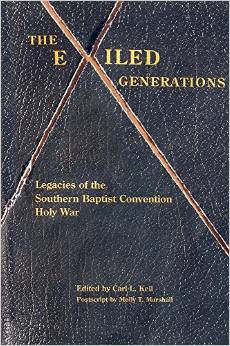By Bob Allen
Many young ministers growing up in Cooperative Baptist Fellowship churches have no frame of reference for the great “split” they hear seminary professors and pastors recall with a sense of pain and loss, yet they find themselves daily caught in its wake, says a former female pastor in a new book about second- and third-generation heirs of the battle over biblical inerrancy that split the Southern Baptist Convention in the late 20th century.
 Bailey Edwards Nelson, former senior pastor at Flat Rock Baptist Church in Mount Airy, N.C., described perils of ministry in a “dually aligned church” in The Exiled Generations: Legacies of the Southern Baptist Convention Holy War, edited by Carl Kell, a Baptist layman who teaches communications at Western Kentucky University.
Bailey Edwards Nelson, former senior pastor at Flat Rock Baptist Church in Mount Airy, N.C., described perils of ministry in a “dually aligned church” in The Exiled Generations: Legacies of the Southern Baptist Convention Holy War, edited by Carl Kell, a Baptist layman who teaches communications at Western Kentucky University.
“This is a Baptist church with no true identity and yet too much identity,” Nelson said. “The truth is that ‘second generation moderates’ find ourselves ministering primarily in churches that continue to embody the split played out in the lives and careers of our predecessors.”
Nelson, who grew up in a Southern Baptist church where the idea of a young girl pronouncing herself called to pastoral ministry wasn’t very popular, found herself at a dually aligned Southern Baptist church after graduating from Mercer University’s McAfee School of Theology and completing a Cooperative Baptist Fellowship pastoral-residency program at a church in Jacksonville, Fla.
Not everyone at Flat Rock was happy when the church voted to call a woman as pastor, Nelson said in the book published by the University of Tennessee Press. Her election got the church kicked out of the Surry Baptist Association. After she finished the essay, Nelson resigned as pastor effective Feb. 28, 2013, citing a lack of consensus among members about the church’s vision and direction for the future.
“We pastor congregations that align themselves with both the Southern Baptist Convention and the Cooperative Baptist Fellowship and often a number of other Baptist entities,” Nelson wrote. “It should surprise no one when these churches have difficulty hiring pastors, not to mention all the other aspects of congregational life.”
“It also should be no surprise that with such a high percentage of CBF churches also being associated with the SBC, the majority of these churches would never consider hiring a woman as their pastor,” she said.
Nelson’s is one of 18 testimonials by individuals whose parents and relatives were purged from or left the Southern Baptist Convention in the wake of the fundamentalist takeover beginning in 1979. Their stories illustrate the era through the eyes of sons and daughters who saw their moderate-leaning parents lose pastoral positions, seminary professorships or leadership opportunities in denominational life and describe the spiritual toll of growing up in emotional and religious exile.
For Kell, the volume follows a trilogy of previous works that began with In the Name of the Father: The Rhetoric of the Southern Baptist Convention Holy War, which he co-wrote with North Carolina State University professor Raymond Camp in 1999.
During research for the first book, Kell said in an introduction to his latest, a number of Southern Baptists came forward with stories of personal exile, but there was no place for them in the book. Camp and Kell decided to begin work on a sequel, derailed when Camp suffered a debilitating stroke early in 2000.
 Kell eventually finished Exiled: Voices of the Southern Baptist Convention Holy War on his own in 2007. The book presented stories of 31 distinguished Baptists stripped of their positions as lay leaders, church members, pastors and prominent officers of the SBC in a leadership purge today known in SBC circles as the “conservative resurgence.”
Kell eventually finished Exiled: Voices of the Southern Baptist Convention Holy War on his own in 2007. The book presented stories of 31 distinguished Baptists stripped of their positions as lay leaders, church members, pastors and prominent officers of the SBC in a leadership purge today known in SBC circles as the “conservative resurgence.”
From there Kell wrote Against the Wind: The Moderate Voice in Baptist Life, published in 2009. In that book Kell argued that the 20th and 21st century Baptist diaspora originated, inadvertently, after World War II in a youth revival movement at Baylor University that introduced a number of young preachers who over time would move into key leadership positions in moderate Baptist life.
While promoting Against the Wind, Kell encountered a review that appeared briefly online by a female Southern Baptist missionary whose father lost his church during the SBC controversy and moved from place to place, and yet her call to missionary service never wavered. The message to Kell, he said, was: “You have to find a way to tell my story.”
The Exiled Generations ends with a postscript chapter titled “Crafting a New Baptist Narrative” by Molly T. Marshall, a casualty of the SBC controversy as a young theology professor forced out of Southern Baptist Theological Seminary in Louisville, Ky., in 1994. She now is celebrating her 10th anniversary as president of Central Baptist Theological Seminary in Shawnee, Kan.
Characterizing the nearly 25-year-old Cooperative Baptist Fellowship as a “sanctuary for healing,” a “new Baptist movement” and “a movement of the Spirit,” Marshall envisions a future “more global, more missional and more pneumatological” for moderate Baptists.
“Pneumatology” is the label ascribed to the study of the Christian doctrine of the Holy Spirit.
“The Spirit continues to call Baptists to new forms of engagement, transgressing limits of human invention,” she wrote. “May we discern God’s holy nudge and act accordingly.”
